- Home
- Colleen Gleason
The Carnelian Crow: A Stoker & Holmes Book (Stoker and Holmes 4)
The Carnelian Crow: A Stoker & Holmes Book (Stoker and Holmes 4) Read online
The Carnelian Crow
A Stoker & Holmes Book
Colleen Gleason
Avid Press
Contents
Preface
1: In Which Miss Holmes Is Outsmarted by a Corvus
2: A Corvus of a Particular Color
3: Wherein Our Heroine’s Life is Completely Tossed Up
4: Our Heroines in High Fashion
5: Of Hidden Doors and Unboxed Corsets
6: A Puzzle of Three-by-Three
7: In Which Our Heroines Are Bathed in the Delicate Aroma of UnDead Ash
8: Wherein a Pickpocket’s Devotion is Revealed
9: A Convoluted Explanation That Includes a History of the Fiction of the UnDead
10: Wherein a Lengthy Conversation Leaves Much Unsaid
11: In Which the Requirements of Friendship Are Debated
12: A Sparkling Evening
13: Wherein a Scotsman is Ahead of the Game
14: In Which Our Heroine is Carried Wildly Downstream
15: Meanwhile, Our Other Heroine is on a Runaway Locomotive
16: Our Two Heroines in a Night of Déjà Vu
17: Two Skirted Figures in an Unsatisfactory Tete-a-Tete
18: In Which Miss Holmes Willingly Relinquishes Control
19: A Startling Revelation
20: The Evening’s Second Unsatisfactory Tete-a-Tete
21: Of Permissible Nomenclature and a Delayed Reaction
22: Of Ales, Pickles, and Carnelian Adornment
23: In Which Evaline Acquires a New Position
24: Wherein Evaline Divulges a Plan
25: In Which Our Heroine is Catapulted Over the Waterfall
26: The Princess of Vovinga Arrives
27: A Far More Satisfactory Tete-a-Tete
28: Revelations, Requests, and Realizations
29: Wherein Miss Stoker’s Acting Ability is Exercised
30: An Exceedingly Satisfactory Tete-a-Tete
31: Far Too Many Questions Than Answers
Stoker & Holmes continues!
Victoria Gardella: Vampire Hunter
About the Author
Also by Colleen Gleason
Please note: at the end of The Carnelian Crow there is an exclusive short story about Evaline’s great-great-grandmother, Victoria Gardella.
Enjoy the read!
Miss Holmes
~ In Which Miss Holmes Is Outsmarted by a Corvus ~
There was a soft tapping at my window.
Normally it wouldn’t have disturbed me, as I am blessed with the ability to slumber deeply, but tonight I was wide awake. Unfortunately, that had been the case for many weeks now. The dark circles beneath my eyes had become large and puffy enough that even Mrs. Raskill had seen fit to make comment.
Declining to rise unless I ascertained that someone or something needed entrance to my bedchamber—the most likely candidate being Miss Stoker, of course, considering the mode of entrance—I peered at the window from the warm comfort of my bed.
The tapping had ceased, and all I could see through the glass was a shaft of moonlight, just touching the edge, and a row of snow-covered roofs across the mews. Thick smoke chugged from a nearby chimney, dark against a charcoal-gray sky, and stars blanketed the heavens.
In the distance, I could hear the constant hum of the mechanized world in which I reside: the dull click of cogs and wheels, a rhythmic clunk of clockworks and pulleys, and the hiss of steam emitting from every corner of London.
Tap, tap, tap.
I sat up. It was a raven—or perhaps a crow; I couldn’t see the shape of its tail, and the difference between the two jet-black specimens in the Corvus genus are hardly discernible otherwise.
And this particular raven (or crow) was using its beak to tap at my window.
How extraordinary.
“Go away,” I suggested flatly, certain the creature could not only hear me, but comprehend. They are amazingly intelligent birds. “I’m sleeping.”
Or, more accurately, trying to sleep.
The sad truth was, ever since the events related to the Theophanine chess queen and the great checkmate that had been carried out by the Ankh, I’d been nothing short of miserable.
My career as a member of the secret league of females working for Princess Alexandra was effectively over. I had nothing to do: no investigations to be carried out, no crimes to solve, no riddles or puzzles or enigmas on which to focus my agile and active mind.
Since late September—over two months—I had not been summoned to the British Museum, where my probably former mentor Irene Adler was employed. In fact, I’d received no communication whatsoever from Miss Adler.
Even the haven of my laboratory had so lost its allure that I’d even agreed to allow Mrs. Raskill to clean up the shambles of my most recent study—which I had neglected ever since that mortifying moment at the British Museum when I realized the master villainess known as the Ankh had outsmarted me.
And on top of that shameful event, the person I considered my closest friend—the one person who truly seemed to appreciate me for who I was, blade-like proboscis and clumsiness and all—had left London.
Dylan Eckhert had not only left London, but he’d left 1889 as well, and returned to his own time: the futuristic year of 2016.
Tap, tap, tap.
I glowered at the window. What on earth was wrong with that addled creature? I knew crows (and ravens) liked shiny objects, but there was nothing about my window that should attract the bird.
Muttering a few unladylike syllables (if Miss Stoker could utter them, I supposed I could as well—particularly since no one was in the vicinity to hear), I flung the heavy bedclothes from my person and slid my feet onto the floor.
Wincing at the harsh chill that somehow managed to seep through the rug next to my bed, I went to the window, intent on shooing away the irritating creature. He could find some other window at which to rap.
Though it was dark, I managed to avoid stubbing my toe on anything other than the Milford’s Gentlelady’s Easy-UnLacer, which I’d forgotten to put away in the wardrobe. Muttering still more unladylike sounds, I raised my foot in order to rub the digit that had connected quite forcefully with the corner of the device’s stand, and would have unbalanced had I not put my hand out and caught the edge of my dressing table.
By now I was fuming: at being awakened (the crow couldn’t know I hadn’t actually been sleeping), at being required to leave my toasty-warm bed, at the pain in my toe (it was still throbbing), and at the indignity of nearly falling onto my cluttered dressing table. Therefore, one can understand the violence with which I accosted the feathered menace.
“Go! Away!” I said, flapping my hands at it. The creature stopped tapping, but instead of flying away, he (surely it must be a male; his persistence even in the face of my annoyance reminded me of a certain Scottish Scotland Yard investigator) cocked his head and looked at me.
Yes, he was definitely looking at me: even in the drassy light of predawn, the moon glow cast him in an eerie sort of spotlight that enabled me to see how his beady eye was transfixed on my person.
In fact, the weight of his eyes was so sharp and intense, I couldn’t help but drop my own gaze to ensure that I was properly covered by my night frock.
I tried again. “Be off, you!” I flapped my hand.
All to no avail. The crow (by now I’d ascertained the shape of his tail and made that determination), seemingly unmoved by my antics, merely tilted his head, shuffled on his feet, and, fluttering his wings, said, “Caw.”
“I have neither t
he time nor the inclination to engage in conversation with you,” I informed the beast. “Now, leave off tapping and be gone!”
He merely ruffled his wings again, shifting, and then fixed me with his other eye.
Drat it. I couldn’t even frighten a blasted crow from my windowsill; how on earth could I ever expect Princess Alix or Miss Adler to engage me again?
To my shock, tears stung my dry, sleep-deprived eyes. I blinked them back bravely, and then I did a very foolish thing.
I opened the blasted window.
(Evaline, who is currently reading over my shoulder as I write these words some years after the fact, has interjected her opinion that opening the window wasn’t, in retrospect, a foolish decision at all. But I rest my case that in the moments immediately following, it most certainly seemed to be.)
When I opened the window, a gust of chill winter air sent goose pimples erupting everywhere on my person, and, even worse, when I flapped my hands vigorously at the crow, instead of flying off, he glided into my bedchamber on a flutter of wings.
“What on earth—no! You are not invited,” I informed him in my most no-nonsense voice. “Remove yourself at once!”
He not only ignored my command, he perched himself on the top of my mirror as if he had every right to be there. For a moment, I had a strong sense of sympathy for the unnamed storyteller in Mr. Poe’s “The Raven.” Who would have thought a crow—or raven, as was the case in that tale—could be such a stubborn creature?
It was then that the indignity became too much, for the winged beast opened his mouth and dropped something on my dressing table.
I didn’t know whether, like bovines and felines, crows often regurgitated their food, but I was incensed. I spun around and yanked up the pillow from my bed—made of feathers from one of his distant cousins; perhaps I should threaten to do the same to him!—and flapped it toward him.
He responded with an emphatic “Caw!” and commenced with making a full observation of my chamber with his beady black eyes.
“Get…out!” I cried, and that was my second mistake of the night. (Evaline, still looking over my shoulder, is in full agreement with this statement.)
I was so agitated that I forgot myself and swung the pillow like a cricket bat. I missed the crow, but unfortunately, on its descent from my wild strike, the pillow swept over my dressing table and sent the bulk of its contents flying and tumbling. Some of the glass bottles shattered, and their contents spilled and oozed onto the rug.
By now my toes were numb from the cold air pouring through the open window, and every part of my body was prickling and shivering.
I hadn’t slept in what seemed like weeks.
My bedchamber was now the scene of a calamity of broad proportions.
I no longer had a job or any worthwhile activity.
I had been outsmarted by a cunning and dangerous villainess in public.
And I had a crow in my bedchamber.
For the first time in my recent memory, I began to cry.
(Evaline, still filled with suggestions for this manuscript, is questioning whether at that point I had closed the window.)
(I’m already ruing the fact that I even told her I was writing down the account of this case. I should have done what Uncle Sherlock’s biographer does. Dr. Watson never allows him to read the stories until after they are published.)
Perhaps it was my pitiful sobs that instilled pity in my nocturnal visitor, for through my angry and violent laments, I discerned the sharp flap of wings.
I looked up in time to see the beast fly through the open window into the cold December night—leaving in his wake the destruction of my bedchamber and what little was left of my dignity.
The next morning, I needed to spare no moment to consider whether that event had been an unpleasant dream. As if the destroyed contents of my dressing table were not enough of a reminder of his presence, the crow had had the audacity to leave a single black feather on the sill as he flew out.
I almost flung open the window once more in order to rid myself of the beast’s calling card, but the chamber’s temperature had finally become bearable again and I was disinclined to submit myself to that freezing air—especially now that I wouldn’t be climbing back beneath the covers.
Mrs. Raskill was cooking something in the kitchen (it smelled divine), and I had a mess to clean up.
Not that I had anything else pressing on my schedule for the day, I thought grumpily as I made my bed.
Listlessly, I began to collect the perfume and oil bottles, hair utensils, tray, and other objects I’d sent flying during my nocturnal tirade. Miraculously, only two bottles had broken, and in relatively short order, I had replaced most everything on the table.
And that was when I saw it.
I’d almost forgotten about it (me, a Holmes!—which was testament to exactly how mentally depressed and slow I had become over the last month) when I saw the one item that belonged on neither my dressing table, nor in my bedchamber at all.
It was no larger than two digits of my little finger, and appeared to be a soft, dingy white…something. Although at first I regarded it with distaste as some sort of regurgitation from the crow, once I looked more closely, I saw that it was a tiny cloth-wrapped packet.
Mildly curious (after all, crows are known for stealing shiny objects, not ones that look like a minuscule laundry package), I picked it up.
As I did so, I realized the crow had not had the object in his mouth when I first noticed him at the window. He couldn’t have done, for he responded to my command to “Be off!” with a sassy “Caw!” and would have dropped the item then if he’d done so. Aside from that, I would have noticed him holding it in his beak.
I considered for a moment whether I was wrong, and that perhaps the bird had not dropped this package onto my dressing table after all, but quickly rejected the possibility. I had seen it fall from his beak. And the object did not belong in my chamber.
Having assured myself of this, I cleared the recently replaced health and grooming accoutrements to the side of my dressing table and turned up the lamp that hovered above it. With the help of a tiny pair of scissors, I was able to cut the string that bound the packet. Carefully setting it aside for further examination, I carefully unrolled the flimsy cheesecloth to expose the object that had been bundled inside.
It was a charm, and it dangled from a small pin. The whole thing was, as I indicated previously, no larger than the top half of my little finger.
I found it quite fascinating that the tiny pendant itself was in the shape of a bird—even, perhaps, a crow.
How coincidental.
And I knew Uncle Sherlock’s opinion about coincidences.
Not to mention this was the most interesting thing to have happened to me in months. I needed to examine the pin and its wrappings more closely, and subject them to a number of chemical and mechanical tests.
I gathered up the wrappings and stood, hardly giving propriety a thought as I padded from my bedchamber still wearing my pink flannel night frock and with my hair in a long braid swaying down my back.
I had no fear of startling my father, the eminent and respected Sir Mycroft Holmes, with the sight of my feminine dishabille, for he never slumbered at home when he could sleep at his office or his men’s club. Which was to say, never. The last time I had seen my father, in fact, had been during the chess queen debacle. Unfortunately, he had been present when I realized how I’d been duped by the Ankh.
Though there was no chance my father could have been subjected to the shock of my informal garb, I had forgotten about both Mrs. Raskill and her nephew, Ben, who visited occasionally, but always on Tuesdays to take her to the butcher shop.
It was Tuesday.
I was in such a state as I burst from my chamber toward my laboratory that I nearly ran them both over from where they were conversing near the kitchen, clearly readying themselves to go out.
“Mina!” shrieked Mrs. Raskill. “What on earth are you�
�”
“It’s no matter,” I called back, hardly sparing a thought for the possible embarrassment I could be feeling at the fact that a young man had glimpsed me in my voluminous night frock. “I’ll take my breakfast in here,” I added to forestall any further comment from the housekeeper.
Once safely in my laboratory, I turned on the gas lamps—sparing a moment, as I nearly always did, to lament the fact that electric lighting (which was so much clearer and cleaner than gaslight) was illegal in London—and scrabbled through the drawer to pull out my Ocular-Magnifyer.
As I settled the handy device in place over one eye, anchored by an ingenious fitting that settled over my head like a jaunty hat, I could not help but be reminded of Inspector Ambrose Grayling, who had gifted me with the tool after mine had broken during the events related to the clockwork scarab and the Society of Sekhmet. Though Grayling hadn’t been at fault, he had taken the blame for the accident, and the replacement he’d sent me was a far finer model than the one I’d owned previously.
Therefore, I was always unusually careful and deliberate when using the eyepiece and affixing it to my head.
Once the magnifyer was in place, I adjusted the focus and magnification and commenced with a closer examination of the pendant. The bird-shaped charm was roughly the size of a large lima bean, and hung from a small bar that was actually a pin. Both the pin-like bar and the charm were flat, and were made from a sort of cloisonné in dark, rich red. The hue was more of a rusty red or mahogany color than a crimson or scarlet.

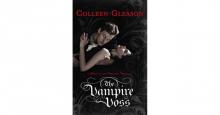 The Vampire Voss
The Vampire Voss Lavender Vows
Lavender Vows Sanctuary of Roses
Sanctuary of Roses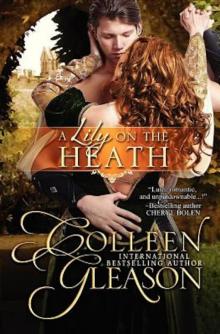 A Lily on the Heath
A Lily on the Heath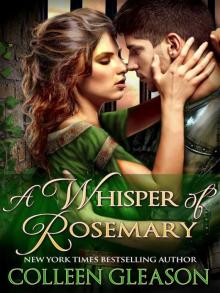 A Whisper Of Rosemary
A Whisper Of Rosemary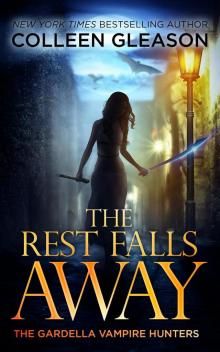 The Rest Falls Away
The Rest Falls Away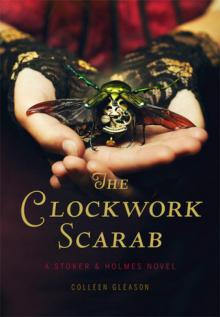 The Clockwork Scarab
The Clockwork Scarab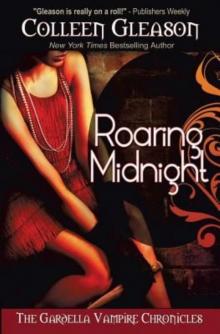 Roaring Midnight
Roaring Midnight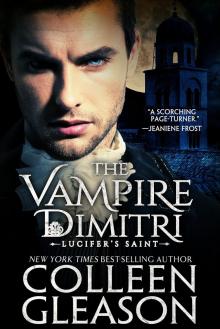 The Vampire Dimitri
The Vampire Dimitri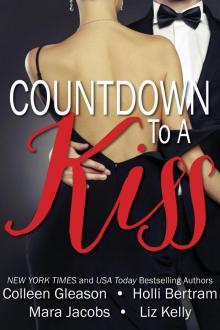 Countdown To A Kiss A New Years Eve Anthology
Countdown To A Kiss A New Years Eve Anthology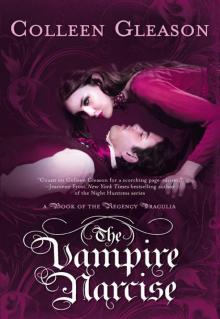 The Vampire Narcise
The Vampire Narcise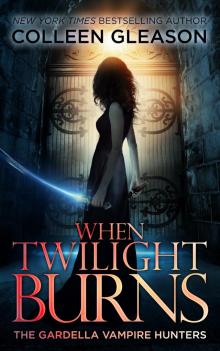 When Twilight Burns
When Twilight Burns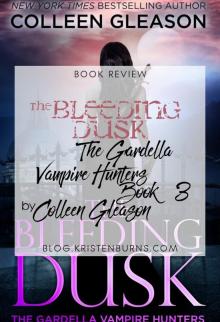 The Bleeding Dusk
The Bleeding Dusk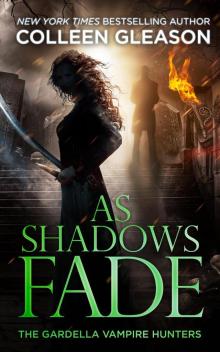 As Shadows Fade
As Shadows Fade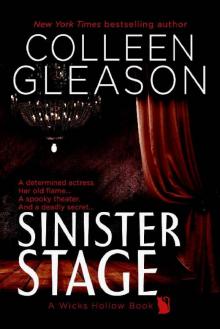 Sinister Stage: A Ghost Story Romance and Mystery (Wicks Hollow Book 5)
Sinister Stage: A Ghost Story Romance and Mystery (Wicks Hollow Book 5)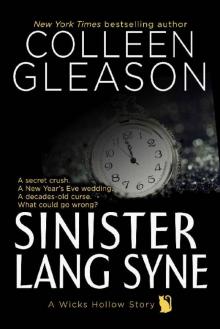 Sinister Lang Syne: A Short Holiday Novel (Wicks Hollow)
Sinister Lang Syne: A Short Holiday Novel (Wicks Hollow) Sinister Sanctuary
Sinister Sanctuary Night Beckons
Night Beckons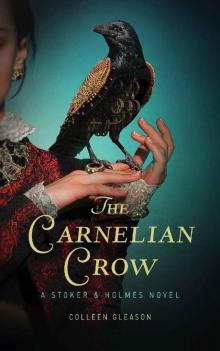 The Carnelian Crow: A Stoker & Holmes Book (Stoker and Holmes 4)
The Carnelian Crow: A Stoker & Holmes Book (Stoker and Holmes 4)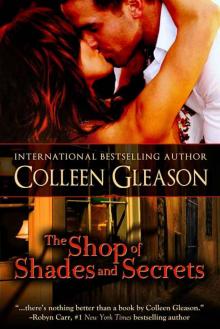 The Shop of Shades and Secrets (Modern Gothic Romance 1)
The Shop of Shades and Secrets (Modern Gothic Romance 1) Lavender Vows tmhg-1
Lavender Vows tmhg-1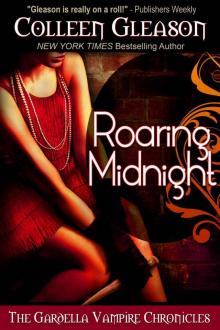 Roaring Midnight (The Gardella Vampire Chronicles | Macey #1)
Roaring Midnight (The Gardella Vampire Chronicles | Macey #1) Lavender Vows (The Medieval Herb Garden Series)
Lavender Vows (The Medieval Herb Garden Series) Dark Secrets: A Paranormal Romance Anthology
Dark Secrets: A Paranormal Romance Anthology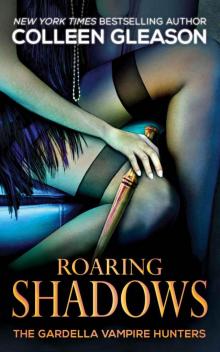 Roaring Shadows
Roaring Shadows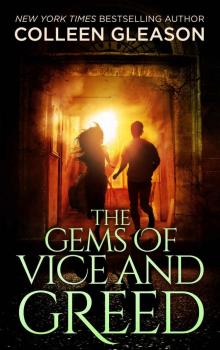 The Gems of Vice and Greed (Contemporary Gothic Romance Book 3)
The Gems of Vice and Greed (Contemporary Gothic Romance Book 3)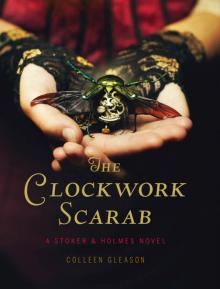 The Clockwork Scarab s&h-1
The Clockwork Scarab s&h-1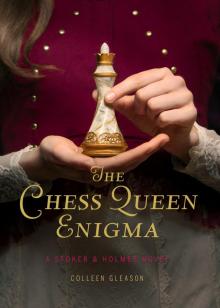 The Chess Queen Enigma
The Chess Queen Enigma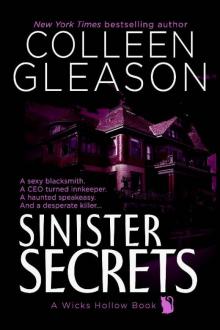 Sinister Secrets
Sinister Secrets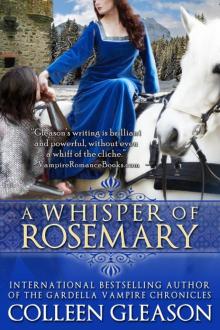 A Whisper of Rosemary (The Medieval Herb Garden Series)
A Whisper of Rosemary (The Medieval Herb Garden Series) Dark and Damaged: Eight Tortured Heroes of Paranormal Romance: Paranormal Romance Boxed Set
Dark and Damaged: Eight Tortured Heroes of Paranormal Romance: Paranormal Romance Boxed Set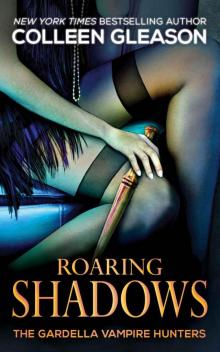 Roaring Shadows: Macey Book 2 (The Gardella Vampire Hunters 8)
Roaring Shadows: Macey Book 2 (The Gardella Vampire Hunters 8)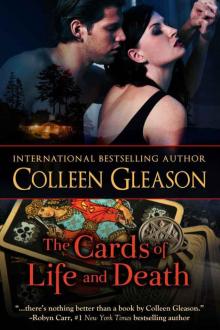 The Cards of Life and Death (Modern Gothic Romance 2)
The Cards of Life and Death (Modern Gothic Romance 2)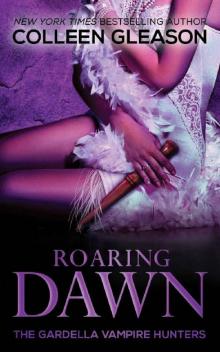 Roaring Dawn: Macey Book 3 (The Gardella Vampire Hunters 10)
Roaring Dawn: Macey Book 3 (The Gardella Vampire Hunters 10)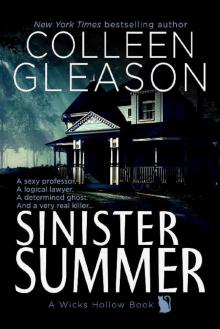 Sinister Summer
Sinister Summer Sinister Sanctuary: A Ghost Story Romance & Mystery (Wicks Hollow Book 4)
Sinister Sanctuary: A Ghost Story Romance & Mystery (Wicks Hollow Book 4)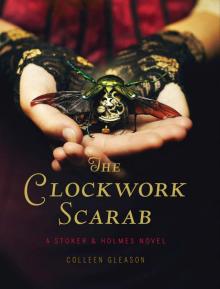 The Clockwork Scarab: A Stoker & Holmes Novel
The Clockwork Scarab: A Stoker & Holmes Novel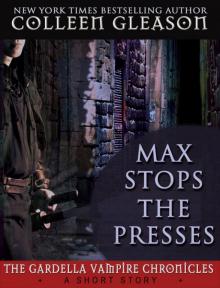 Max Stops the Presses
Max Stops the Presses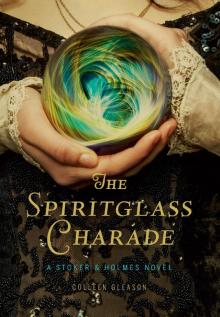 The Spiritglass Charade
The Spiritglass Charade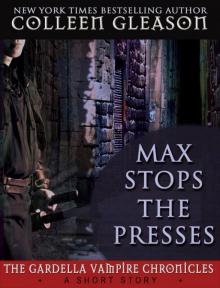 Max Stops the Presses: A Gardella Vampire Chronicles Short Story
Max Stops the Presses: A Gardella Vampire Chronicles Short Story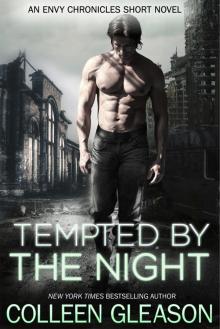 Tempted by the Night
Tempted by the Night